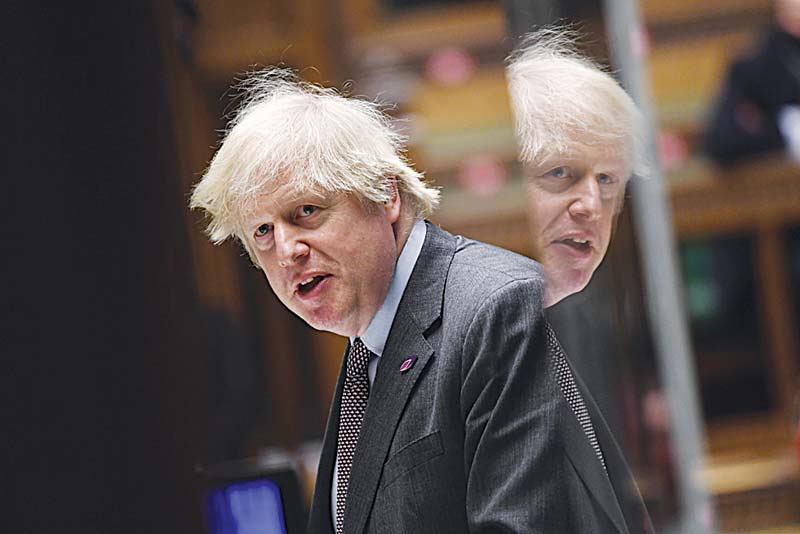 LONDON: A handout photograph released by the UK Parliament shows Britain's Prime Minister Boris Johnson taking part in the weekly Prime Minister's Questions, in a hybrid, socially distanced session at the House of Commons in London on Wednesday.—AFP
LONDON: A handout photograph released by the UK Parliament shows Britain's Prime Minister Boris Johnson taking part in the weekly Prime Minister's Questions, in a hybrid, socially distanced session at the House of Commons in London on Wednesday.—AFPLONDON: Prime Minister Boris Johnson headed to Scotland yesterday to praise the United Kingdom's collective response to coronavirus, in a bid to counter record support for independence. Johnson wants to highlight the British government's role in Scotland tackling the pandemic, from deploying the army to help roll out vaccines to providing additional financial support. The visit comes with polling indicating that Scots overwhelmingly think First Minister Nicola Sturgeon, leader of the Scottish National Party (SNP), has done a better job at handling the crisis than Johnson.
Twenty consecutive polls have suggested majority support for independence, and the SNP has published an 11-point "roadmap to a referendum" as well as a newly-formed "independence taskforce". Johnson has insisted the last independence referendum in 2014, which saw Scots back staying in the UK by 55 to 45 percent, was a once-in-a-generation vote and repeatedly rejected calls for him to allow another vote.
As well as the backdrop of the independence issue, Johnson faces another row with Sturgeon, who has questioned if his trip breaches coronavirus lockdown rules. Sturgeon said she was "not ecstatic" about the visit, adding that leaders should stick to the same rules as the general public about making only essential journeys.
"People like me and Boris Johnson have to be in work for reasons people understand, but we don't have to travel across the UK. We have a duty to lead by example," she said Wednesday. Johnson's Downing Street office hit back, insisting it was "a fundamental role of the PM to be the physical representative of the UK government" and that it was "right that he's visible and accessible for communities and businesses and the public".
Senior minister Michael Gove, a Scot who chairs a weekly sub-cabinet meeting on preserving the UK, added that the visit would garner valuable insight about the government's pandemic response. "It's also important the prime minister hears from those on the frontline what is going well and what needs to improve," he told Sky News.
'Benefits of cooperation'
The devolved governments in Scotland, Wales and Northern Ireland are responsible for their own health policies, and the pandemic has thrust local leaders and their administrations into the spotlight more than usual. With each administration dictating their response, they have often pitted themselves against London, which sets policy for England, and provided a glimpse into how independence could operate.
Despite similarly grim case counts and virus mortality rates to the rest of Britain, Sturgeon has won praise for her handling of the crisis and performances in daily press conferences. In contrast, Johnson has been vehemently criticized for repeatedly reacting too slowly as the crisis has evolved, and Britain now has one of the highest death tolls globally. However during his visit, he will stress that the UK government has provided pivotal support, in particular in emergency response and testing, alongside the vaccine drive and funding.
"The great benefits of cooperation across the whole of the UK have never been clearer than since the beginning of this pandemic," Johnson will say, according to his office. The SNP said the trip was evidence of a "prime minister in panic" and accused him of "mimicking Donald Trump's explicit attempts to block democracy". "The longer Boris Johnson reads from the Trump playbook of democracy denial, the more support for Scottish independence will grow," SNP deputy leader Keith Brown said.
Meanwhile, the 2016 vote for Brexit -- opposed by a majority in Scotland -- has proved highly contentious north of the border, with nationalists arguing it provides the basis for another independence referendum. The SNP is also predicted to win a landslide in Scottish parliament elections in May, with Sturgeon widely expected to use that to further bolster claims of a mandate for an independence vote. - AFP









